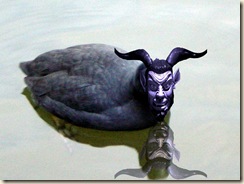.
.
The ancient Egyptians used to put the innards of pharaohs into canopic jars and then place them deep in tombs, laying them reverently next to the pharaoh’s mummified body. This is what books and the internet will tell you. However, this is a lie known only to the overseer of the canopic jar factory.
Books and the web claim that pharaohs were wrapped up in bandages and deposited under tons of stone with these four little jars by their side to help them to achieve the afterlife. This is another lie, again known only to the overseer of the canopic jar factory. The fact is these jars that held the separated vital organs from the body, sealed tight under magical lids, were intended to ensure that that person never ever walked the earth, or experienced any afterlife ever again.
In fact it was actually the overseer of the canopic jar factory who personally trussed up certain individuals and stuffed them into pyramids. It’s true.
The doomed soon to be mummified individuals had no doubt driven the canopic pot factory overseer into the realms of utter madness by their acts of witless stupidity.
Imagine the scene: little pots beautifully designed and painted. These jars had been skilfully fashioned from fine clay that had been carefully washed and sieved from the banks of the Nile. Their creation was the result of a long intricate process, a time consuming process, but above all an absolute labour of love.
Perhaps these twinkling jars were first intended to hold delicious spices, or perhaps even glistening gems. Imagine them displayed on a market stall under the subtle Egyptian lighting of a hot setting sun. They would have looked magnificent until the canopic jar maker’s apprentice bumped into the shelving and sent them all crashing to the floor.
When these precious pots were destroyed, in this land of camels, breaking backs and limited straw, the canopic jar overseer finally lost it. He could not have borne their destruction. This was the moment when he turned upon his apprentice.
(Now this next paragraph is not for the squeamish…so do skip ahead…)
He would have ripped out the fool’s innards, stuffed them into the last four unbroken pots and then wrapped the rest of the body in bandages to cover up his ghastly deed.
Howling with rage as he realised he’d just condemned his own soul to the darkest realms of the cosmos by this foul deed, he then began to drag the mummified body out towards the city precincts. His cries must have rent the air. Fellow traders would have closed their shutters out of fear. Children woken from innocent sleep would have cried for their own mummies on hearing the wailing sound of the demented canopic jar overseer dragging the corpse towards the unhallowed ground of the dead beyond the city limits.
It would have been the wonder of the world when the canopic jar overseer, with supercharged demonic strength borne from his despair, was then able to lift slabs of stone weighing tons and hurl them into place over the body. One stone would not have been enough. He needed more to pin down forever the spirit of this clumsy idiot.
So it was that he buried the body unaided under thousands of tons of rocks. There were no slaves building the pyramids. No skilled workers toiling up ramps with blocks and ropes. No, there was just the mad canopic jar factory overseer whose eye for detail and his need to ensure that the person he’d buried would never ever walk again who'd created with his artistry the first pyramid all in one night.
Nonsense, you think?
Really?
Well, it’s not and I’ve got proof!
Let’s start with the clay.
It should have been the ideal teaching situation, most of the children had gone on a trip and there were only six children left. The clay was untouched and glistening fresh from the packet. Music was playing quietly in the background. The sun was shining. All was well with the world.
I demonstrated to my apprentice potters how to form the base of the pot and stressed how it had to be kept loose on the board. I helped ‘The Girl’ first; she is shown again and again how to shape her clay. Finally, she is helped to make a decent base which doesn’t stick to the board, and then I move on.
By the time I get back to her, her pot base is stuck firmly to the board and no longer looks anything like the base I left her with. I sigh inwardly and we begin again.
She has now to roll out sausages for her coiled pot. I hastily reshape her base, show her how to use the slip, help her with the first few coils, and then I move on. It’s going to be a beautiful pot.
On my return she has succeeded in rolling sausages which are in the shape of a miniature python in the process of digesting a double humped camel. Similar coils of bulimic fatness and anorexic thinness have already been ‘added’ to the pot. The light shines through its chinky cracks and glints like Egyptian eyes.
I sigh quietly, demonstrate the rolling of clay sausages again, and move on.
On my return 'The Girl's' pot resembles a drunken wobbly rollercoaster.
‘Don’t worry,’ I say as I take in a deep breath and count slowly to five. ‘We won’t make it any higher. You just need to smooth out the holes gently like this.
I demonstrate. I watch her a moment, she’s doing it perfectly, and then I move on.
When I return she has thinned the pot in places to the wafer thinness of papyrus. Its sides lurch like a drunken Egyptian’s blubbery lips.
‘What happened?’ I exclaim in horror.
The other potters look up with mild interest from their own sturdy chunky pots as ‘The Girl’s’ pot pirouettes around its base with flapping clay skirts.
‘Dunno,’ The girl say. ‘It just went like that.’
I fold, crease, meld and blend the pot back to its intended strong beauty.
‘Now just gently smooth the lip of the pot,’ I say before I move on.
‘Time’s up.’ I announce a few minutes later; and I explain that they are to place their pots on the window sill.
Pots are gently eased from the boards, and I place each one in turn carefully on the window sill.
‘Mine is stuck to the board, ‘The Girl’ moans.
I look.
There is a deformed lifeless thing on her board.
A collapsed heap of grey clay that bears no resemblance to anything.
The clay is firmly stuck to the board.
‘It’s stuck to the board,’ ‘The Girl’ wails.
I am astonished and can barely speak.
’Scrape it off and put it back in the tub,’ I say coldly looking at the clock and realising that there is no time left to help again.
‘I can’t.’ The girl moans. ‘It’s stuck.’
It’s left to me to scrape the clay off the board for her. She skips away and goes for her dinner, while my nails become ingrained with clay.
The following day I give her another chance to make a pot under even closer supervision.
Towards the end of the lesson her pot is looking almost perfect.
I’m keeping a very close eye on her. I have to leave her for a few moments to help somebody on a computer, and of course by the time I return the pot is ruined.
‘What happened?’ I bellow, as all patience is swiftly sapped out of me. ‘What have you done?’
The pot, a gargoylic caricature of itself is thin and floppy again. It also seems to be suddenly super glued to the board.
‘Go and wash you hands now,’ I hiss as I attempt to save it.
By the time ‘The Girl’ returns, it looks like a pot again. She’s pleased and happy as I put it to dry on the safest part of the window ledge. Well out of her reach.
The caretaker at the end of the day is closing the blinds and I lunge to save ‘The Girl’s’ pot from certain destruction. The falling blind would have crushed it, luckily it survived.
The next day we are to make the lids of the jars.
I barely leave the side of ‘The Girl’.
I rescue the lid from sticking to the board. I help her to shape the head and to use the slip to attach the ears. The lid is looking good. I leave her for five seconds and the face has collapsed. ‘Don’t worry,’ I say. ‘It looks great,’ I lie, as I gently carry the lid away from her and place it to dry.
The following day I mix up some special paints for the group. Another group has joined us and I’m busy helping the younger ones. All ‘The Girl’ has to do is to paint her pot and lid. I’ve ensured that all the paint she is likely to need is close to her, together with paint brushes. All she has to do is paint.
The music is playing softly in the background. There is sunshine. Everyone is happy. I am the happiest canopic jar overseer in the world.
‘My pot’s broken,’ I hear the ‘The Girl’ exclaim suddenly.
I look up in dismay, as she shows me the three pieces of pot she’s holding in her hand.
‘Don’t worry,’ I say quietly. ‘It can be glued back together. Just paint the rest of the pot and I’ll glue it at the end for you.’
When I return the pot is painted in hideous colours. Black is running onto yellow and yellow into black.
‘I’ve finished,’ The Girl declares.
I ask her to use more of the black to paint over the mistakes. I make the mistake of picking up the lid of her pot and find my hands are now bright red…she’s painted the underneath of the lid and not bothered to warn me. I help her with the black paint. Then I realise she’d got paint on the edge of the table. My new trousers are now covered in bright red paint. I go into a side room to quickly wipe it off before it sets and return to discover that ‘The Girl’ has already used the glue and fixed the broken pieces into place on her pot. They are not in the right places, and look more like ill fitting jigsaws. I search for the missing piece. There is no sign of it. I rescue her hideous pot and put it to dry once more and send her out to join the others on the playground for her own safety.
Above me Egyptian gods are sighing. I look at the chaos on the table where ‘The Girl’ had been sitting. There is clay marking the carpet around where she’d been sat. I’m going to have to scrub it before the cleaner sees it, and goes wild.
It’s then that I hear the ancient whisperings from the canopic jar makers of old…ancient voices of the true builders of the pyramids…they are calling to me from across time… mummify her…mummify her…mummify her...
And oh…it’s so tempting
But luckily for ‘The Girl’ there were no bandages to hand…this time.
...

























